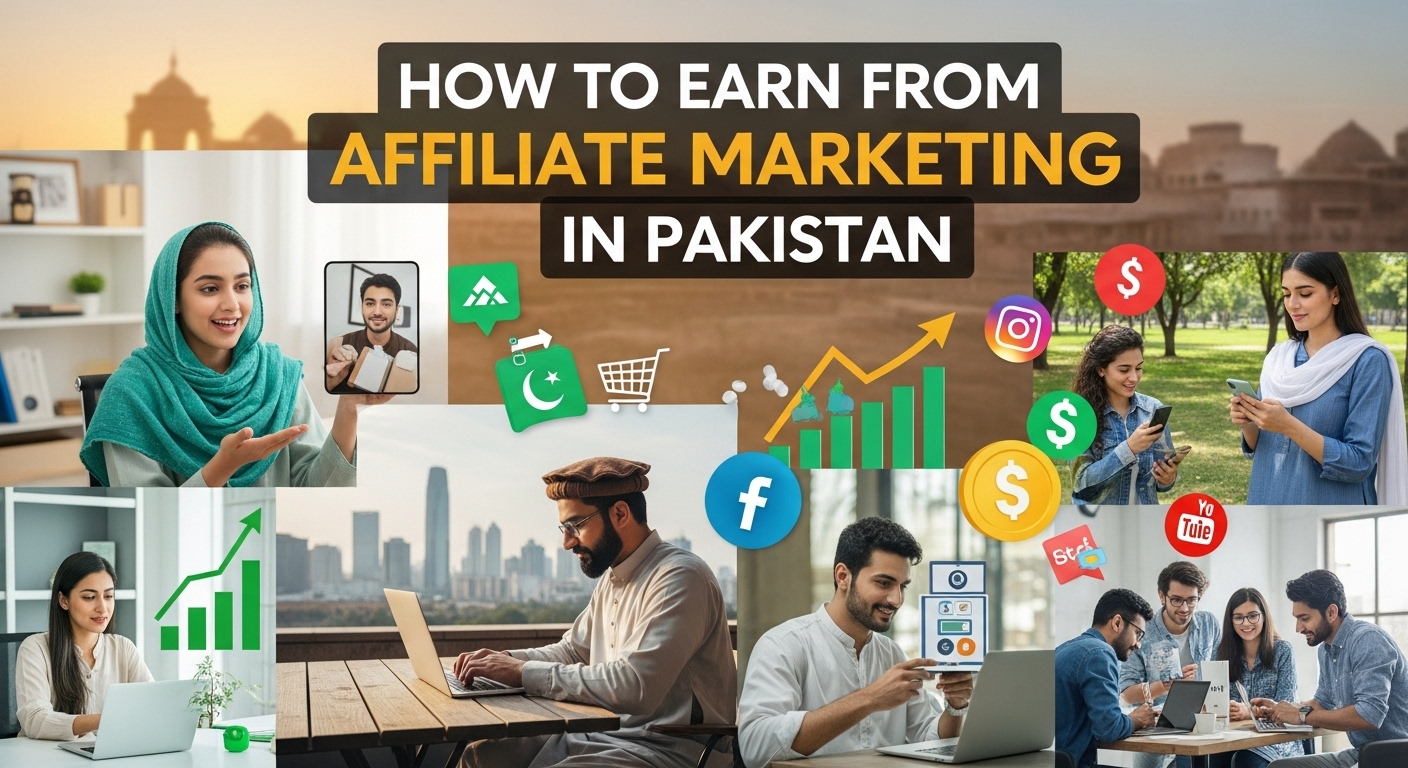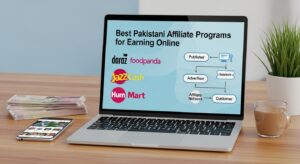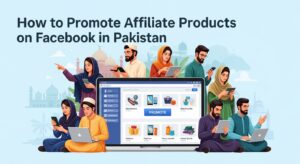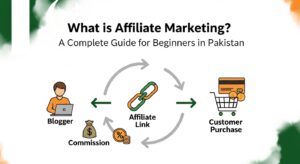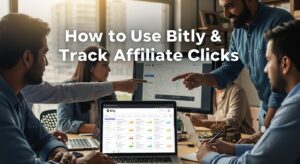In today’s digital age, earning money online has become a tangible reality for many Pakistanis, and one of the most popular and effective methods is affiliate marketing. Imagine promoting products or services you genuinely believe in, and earning a commission every time someone makes a purchase through your unique link. That’s the essence of affiliate marketing, and it’s a field brimming with potential in Pakistan.
Whether you’re a student looking for a side income, a housewife wanting to contribute to the household, or simply someone seeking financial independence, affiliate marketing offers flexibility and the chance to build a sustainable online income. This comprehensive guide will walk you through every step of the journey, from understanding the basics to mastering advanced strategies, specifically tailored for the Pakistani context. Let’s get started on your path to earning from affiliate marketing in Pakistan.
What is Affiliate Marketing and How Does It Work in Pakistan?
Understanding the Core Concept
Affiliate marketing is essentially a performance-based marketing strategy where you, as an “affiliate,” promote a “merchant’s” products or services. When your promotion leads to a desired action, usually a sale, a lead, or a click, you earn a commission. It’s a win-win: merchants get more sales and exposure, and affiliates earn money for their promotional efforts.
The process is straightforward: you join an affiliate program, receive a unique tracking link, share this link with your audience, and when someone uses your link to complete a purchase or action, the system tracks it, and you get paid. It’s a truly global model that has gained significant traction in Pakistan.
The Pakistani Context
In Pakistan, the e-commerce landscape is growing rapidly, opening up numerous opportunities for affiliate marketers. Local platforms are emerging, and international giants are accessible. Understanding the local consumer behavior, payment methods, and popular niches is key to success here. Many Pakistanis are now comfortable with online shopping, which directly translates into a larger audience for your affiliate efforts.
Step 1: Discover Your Niche (Your Area of Expertise and Passion)
- Brainstorm Your Interests and Hobbies: Start by listing down everything you’re passionate about, things you enjoy learning about, or topics you have significant knowledge in. Do you love tech gadgets? Are you passionate about health and fitness? Do you have a knack for cooking or home décor? Your enthusiasm for a topic will make it easier to create engaging content.
- Research Market Demand in Pakistan: Once you have a few ideas, it’s time to see if there’s an audience and a market for them in Pakistan. Are people searching for these products or information online? Tools can help you analyze search volumes and trends. Look at what’s popular on local e-commerce sites like Daraz, or what topics are trending on social media in Pakistan.
- Evaluate Profitability: Some niches are more profitable than others due to higher-priced products or recurring commissions. Consider the types of products available in your chosen niche and their typical commission rates. For example, high-ticket items like electronics or online courses often offer higher commissions than low-cost consumables.
- Assess Competition: While you want a niche with demand, you also don’t want one that’s overly saturated. Look at what other affiliate marketers are doing in that niche. Can you offer a unique perspective or a better approach? Sometimes, a smaller, more specific sub-niche (e.g., “gaming laptops for students in Pakistan” instead of just “laptops”) can be less competitive and more profitable.
Common Mistakes and Tips
A common mistake is picking a niche solely based on potential earnings without any personal interest. This often leads to burnout. Choose something you can genuinely talk about for a long time. Also, don’t be afraid to niche down further if the initial niche feels too broad or competitive.
Step 2: Choose Your Platform (Where You’ll Reach Your Audience)
- Blogging/Website: This is a highly recommended option for long-term affiliate marketing. A blog allows you to create detailed reviews, comparison articles, how-to guides, and evergreen content. You have full control over your content and design. You’ll need to choose a domain name (e.g., yournichepakistan.pk), a reliable web host, and a content management system like WordPress.
- YouTube Channel: If you’re comfortable on camera, a YouTube channel can be incredibly effective, especially for product reviews, unboxings, and tutorials. Visual content is highly engaging and can build a strong connection with your audience. You can include affiliate links in your video descriptions.
- Social Media (Facebook, Instagram, TikTok): These platforms are excellent for reaching a large audience quickly, especially if your niche is visually driven (fashion, beauty, food) or involves short-form content. You can use posts, stories, reels, and live sessions to promote products. Building a community around your niche on social media can be highly lucrative.
- Email Marketing: Once you have an audience (from your blog, YouTube, or social media), building an email list is crucial. Email allows you to directly communicate with your most engaged audience, offer exclusive deals, and build deeper relationships. This is often seen as a secondary platform that complements your primary content channel.
Common Mistakes and Tips
Don’t try to be on every platform at once. Start with one or two where you feel most comfortable and where your target audience spends most of their time. Once you’ve established a presence, you can expand. Also, remember that a self-hosted website gives you the most control and is generally considered a more stable long-term asset than relying solely on social media platforms, which can change their algorithms or policies without notice.
Step 3: Join Affiliate Programs and Networks (Finding Products to Promote)
- Direct Merchant Programs: Many companies run their own affiliate programs. If there’s a specific brand or product you admire in your niche, check their website (usually in the footer) for an “Affiliates,” “Partners,” or “Referral Program” link. Examples in Pakistan might include local e-commerce stores, online service providers, or educational institutions.
- Affiliate Networks: These are platforms that act as intermediaries between merchants and affiliates. They host thousands of affiliate programs under one roof, making it easier to find relevant products and manage multiple programs. They also handle tracking, reporting, and payments.
- International Networks accessible in Pakistan: Many global networks welcome Pakistani affiliates. You’ll find programs for a vast range of products, both digital and physical. Keep in mind that payouts might be in USD or other currencies, which you’ll then convert to PKR.
- Local Pakistani Programs: Daraz Affiliate Program is a prominent example for physical products within Pakistan. It’s often a great starting point for beginners as it deals with local currency (PKR) and caters to a Pakistani audience. Look for other local e-commerce sites or service providers that might have affiliate programs.
- Consider Digital vs. Physical Products: Digital products (e-books, online courses, software, web hosting) often offer higher commission rates (sometimes 30-70% or more) because they have lower overheads for the merchant. Physical products (electronics, fashion, home goods) typically have lower commission rates (1-10%), but they often have a broader appeal and higher sales volume.
Common Mistakes and Tips
Don’t just join every program you find. Focus on programs that offer products truly relevant to your niche and that you would genuinely recommend. Promoting too many irrelevant products can dilute your brand and confuse your audience. Always prioritize quality and relevance over high commission rates alone. A higher commission means nothing if the product is not good or not relevant to your audience.
Step 4: Create High-Quality, Valuable Content (Your Marketing Engine)
- Understand Your Audience: Before you write or record anything, put yourself in your audience’s shoes. What are their pain points? What information are they looking for? What kind of language do they use? Tailoring your content to their needs is essential.
- Content Types: Diversify your content to keep things fresh and cater to different preferences:
- Product Reviews: In-depth analyses of products, highlighting pros, cons, and personal experiences. For example, “Daraz Mobile Phone Review: Is the XYZ Model Worth It in Pakistan?”
- Comparison Articles: Pitting two or more products against each other to help users decide. “Best Budget Laptops for University Students in Pakistan: HP vs. Dell.”
- How-To Guides/Tutorials: Showing users how to use a product or solve a problem with a product. “How to Set Up a WordPress Blog in Pakistan (with Recommended Hosting).”
- “Best Of” Lists: Curated lists of top products in a category. “Top 5 Skincare Products for Oily Skin in Pakistan.”
- Informational Articles: Content that educates your audience about a topic related to your niche. “Understanding Financial Investments for Beginners in Pakistan.”
- Incorporate Keywords Naturally: Use relevant keywords that people search for in Pakistan to help your content rank higher on search engines. However, avoid “keyword stuffing”; your content should always sound natural and provide value first.
- Focus on Value and Authenticity: Don’t just list features. Explain the benefits. Share your honest opinion and experience. If you genuinely believe in a product, your enthusiasm will be contagious. People can spot inauthentic recommendations from a mile away.
- Call to Action (CTA): Clearly guide your audience on what to do next. This could be “Click here to buy now,” “Learn more about this product,” or “Check out the latest prices.” Make your CTAs prominent and compelling.
- Strategic Link Placement: Integrate your affiliate links naturally within your content. Don’t just dump them at the end. Place them where they are most relevant and helpful to the reader, often after you’ve provided sufficient information about the product.
Common Mistakes and Tips
A major mistake is creating purely promotional content without offering any value. Your audience will quickly disengage. Another error is not disclosing your affiliate relationship (more on this later). Be transparent and helpful. Always proofread your content and ensure it’s easy to read and understand, especially for a Pakistani audience.
Step 5: Drive Traffic to Your Content (Getting Eyeballs on Your Links)
- Search Engine Optimization (SEO): This is a long-term strategy but incredibly powerful. Optimizing your content for search engines like Google means your articles or videos will appear higher in search results when people look for relevant information. This involves keyword research, optimizing your titles and descriptions, building quality backlinks, and ensuring your site loads quickly.
- Social Media Marketing: Actively promote your content on your chosen social media platforms. Share snippets, ask questions, run polls, and direct people to your full content. Engage with your followers and participate in relevant groups or communities. Consistency is key here.
- Email Marketing: As mentioned, your email list is a powerful asset. Send out newsletters, new content alerts, or exclusive offers to your subscribers. This is a highly effective way to drive repeat traffic from an engaged audience.
- Paid Advertising (Optional for Beginners): Once you start seeing some success, you might consider paid ads (Google Ads, Facebook Ads) to accelerate your traffic. This allows you to target very specific demographics and interests. However, it requires a budget and a good understanding of advertising platforms to be profitable.
- Forum and Community Engagement: Participate in online forums, Reddit communities, or Facebook groups related to your niche (e.g., tech forums, beauty groups in Pakistan). Provide helpful answers and solutions, and where appropriate, gently share your content. Avoid blatant self-promotion, which can get you banned.
Common Mistakes and Tips
Ignoring SEO is a common pitfall for beginners. While it takes time, organic traffic is free and highly sustainable. Another mistake is being too spammy with your links on social media or forums. Always aim to provide value first. Focus on building an audience, not just making quick sales.
Step 6: Track, Analyze, and Optimize (Improving Your Performance)
- Utilize Affiliate Dashboard Analytics: Every affiliate program or network will have a dashboard where you can see clicks, conversions, and commissions. Regularly check these reports to understand which links are performing well.
- Website Analytics (Google Analytics): If you have a website, Google Analytics is indispensable. It tells you where your visitors are coming from, which pages they visit, how long they stay, and much more. This helps you understand your audience’s behavior on your site.
- A/B Testing: Test different headlines, content formats, call-to-action buttons, or even product placements to see what resonates best with your audience and leads to higher conversions. For example, try two different versions of a review article and see which one generates more clicks on your affiliate links.
- Conversion Rate Optimization (CRO): Focus on improving the percentage of visitors who complete a desired action (like clicking your affiliate link or making a purchase). This can involve refining your content, improving your website’s user experience, or making your CTAs more prominent.
- Adapt to Trends: The online world, especially in Pakistan, is constantly evolving. Stay updated on new products, consumer trends, and platform changes. For instance, if a new smartphone model is released and becomes popular in Pakistan, you should be ready to review it.
Common Mistakes and Tips
Many beginners overlook the importance of analytics, leading to stagnation. Don’t be afraid to experiment and change your approach based on what the data tells you. What works for one niche or audience might not work for another. Be patient, as optimization is an ongoing process.
Step 7: Legal and Ethical Considerations for Pakistan
- Affiliate Disclosure: Always disclose to your audience that you are an affiliate and that you may earn a commission if they make a purchase through your links. This builds transparency and trust. You can place this disclosure prominently at the beginning of your articles, in video descriptions, or in a clear disclaimer on your website.
- Privacy Policy: If you collect any user data (e.g., through email sign-ups or website analytics), you must have a clear privacy policy on your website explaining what data you collect and how it’s used. This is a legal requirement in many places and good practice globally.
- Terms and Conditions: For your website, having terms and conditions can outline the rules for using your site, disclaimers, and intellectual property rights.
- Tax Implications: As you start earning from affiliate marketing, remember that this income is subject to tax. It’s advisable to consult a tax advisor in Pakistan to understand your obligations, register with the Federal Board of Revenue (FBR), and file your taxes correctly. Many freelance earnings are considered taxable income.
- Promote Honestly: Never make false claims about a product or service. Only promote products you genuinely believe in and that you’ve researched thoroughly. Misleading your audience will destroy your reputation.
Common Mistakes and Tips
Ignoring disclosure is a major mistake that can harm your credibility. Don’t try to hide your affiliate links. Transparency builds trust. Also, neglecting tax obligations can lead to problems down the line; proactive planning is always better.
Step 8: Scale and Diversify Your Income (Growing Your Business)
- Expand Your Niche: If you’ve mastered a sub-niche, consider expanding into broader, related topics within your main niche. For example, if you focused on “gaming laptops,” you might expand to “gaming accessories” or “PC building guides.”
- Add More Affiliate Programs: Explore and join more affiliate programs or networks that offer complementary products relevant to your audience. This increases the range of options you can promote.
- Create Your Own Products: Once you’ve established yourself as an authority, you might consider creating your own digital products, such as e-books, online courses, or premium content. This gives you 100% of the profit and further solidifies your brand.
- Offer Services: Leverage your expertise to offer consulting, coaching, or freelance services related to your niche. For example, if you review cameras, you could offer photography workshops.
- Implement Other Monetization Methods: Besides affiliate marketing, consider adding other income streams like display advertising (e.g., Google AdSense for websites) or sponsored content, provided they align with your brand and don’t detract from your primary affiliate focus.
- Outsource Tasks: As your business grows, you might find yourself overwhelmed. Consider hiring freelancers (writers, video editors, virtual assistants from platforms) to help with content creation, social media management, or SEO, freeing up your time to focus on strategic growth.
Common Mistakes and Tips
Trying to scale too quickly without a solid foundation is a common mistake. Master one or two traffic sources and content types before branching out. Also, don’t diversify just for the sake of it; ensure new ventures align with your brand and audience.
Payment Methods for Affiliate Marketers in Pakistan
Receiving your hard-earned commissions is an important part of the process. In Pakistan, affiliates often deal with a mix of local and international payment solutions.
- Bank Transfers (Local and International): Many international affiliate networks pay via direct bank transfers, which can be received by most Pakistani banks. For local programs like Daraz, direct bank transfers to your Pakistani bank account are standard.
- Payoneer: This is a very popular option for Pakistani freelancers and affiliate marketers who work with international platforms. Payoneer provides you with a virtual US bank account (and others) to receive payments, which you can then withdraw to your local Pakistani bank account at competitive exchange rates.
- PayPal (Indirectly): While PayPal doesn’t directly operate in Pakistan for receiving payments, some affiliates use services that act as intermediaries or have arrangements with friends/family abroad to receive payments into their PayPal accounts, which are then transferred to Pakistan. However, this is not a direct or officially supported method and should be used with caution.
- Wise (formerly TransferWise): Wise offers international money transfers with lower fees and better exchange rates compared to traditional banks, making it another viable option for receiving international commissions.
Practical Tip:
Always verify the payment methods supported by an affiliate program before joining. Factor in any transfer fees or exchange rates when calculating your potential earnings. It’s wise to have at least one reliable international payment solution like Payoneer set up.
Conclusion: Your Journey to Success in Affiliate Marketing in Pakistan
Affiliate marketing in Pakistan is a legitimate and highly rewarding way to earn online. It offers the flexibility to work from anywhere, the potential for significant income, and the satisfaction of building a valuable asset. However, it’s not a get-rich-quick scheme. It requires dedication, consistent effort, continuous learning, and patience.
By focusing on providing genuine value, building trust with your audience, and continuously optimizing your strategies, you can carve out a successful path in this dynamic industry. Remember, the journey of a thousand miles begins with a single step. Take that first step today, choose your niche, start creating, and you’ll be well on your way to becoming a successful affiliate marketer in Pakistan.
Resources
Affiliate Programs to Join
- Daraz Affiliate Program – Promote products on Pakistan’s leading e-commerce platform and earn commissions.
- Amazon Associates – Earn by linking to millions of Amazon products worldwide.
- ClickBank – Promote digital products with high commission rates.
- Digistore24 – Global platform offering digital and software products with recurring payouts.
- Fiverr Affiliates – Earn by referring users to Fiverr’s freelance services.
Essential Tools for Affiliate Websites
- Hostinger Affiliate Program – Promote hosting services and earn generous commissions.
- Google Analytics – Track and optimize affiliate traffic and conversions.
- WordPress – Build fast, customizable websites for your affiliate content.
International Payment Solutions
- Payoneer – Receive affiliate payouts directly into your Pakistani bank account.
- Wise (formerly TransferWise) – Send and receive international payments with low fees and real exchange rates.

